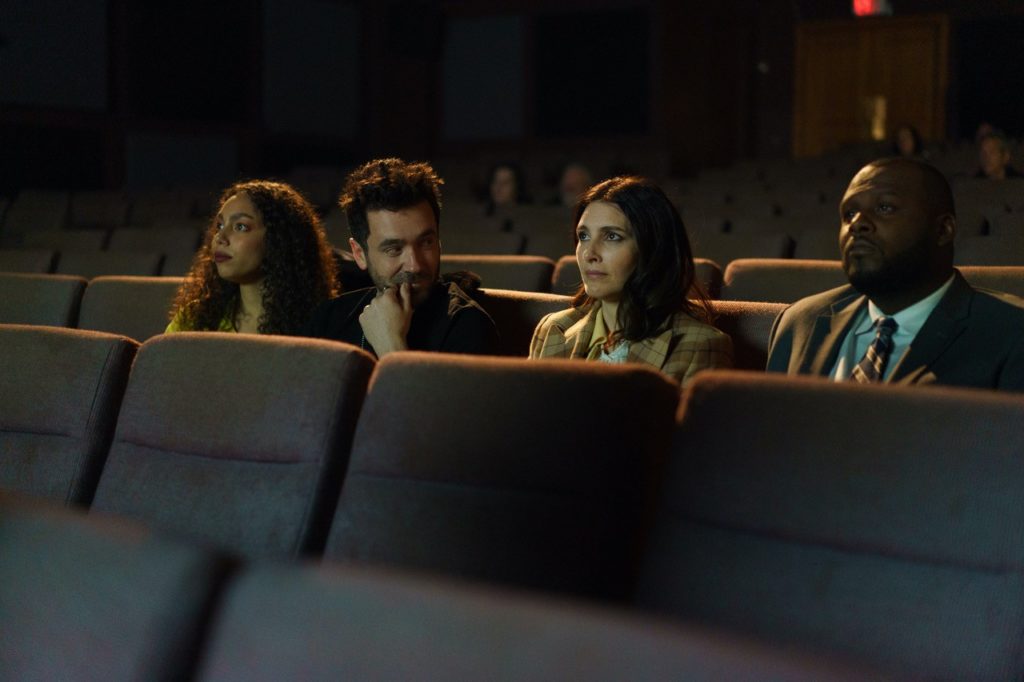|
Emma Ferreira, Allan Hawco, Liane Balaban, and Ryan Allen in "Midnight at the Paradise" (2023) The Paradise Theatre on the corner of Bloor Street and Westmoreland Avenue has been a part of Toronto’s neighborhood for decades. With its 1930s art deco style and welcoming atmosphere, the Paradise brings audiences together. It’s a place where people not only watch films, but create memories, and make connections with people that last forever, no matter how much time passes. For the characters in “Midnight at the Paradise,” a gem of a picture directed by Vanessa Matsui, the theatre is a checkpoint. It represents a moment of reflection, and a reminder of the past. It is through the significance of this landmark that the film gently finds its way. From passion and grief, to the fickleness of time, resonant themes are explored with care and the power to evoke strong emotion. With terrific subtext and authentic performances, “Midnight at the Paradise” shines as a meditative slice-of-life story about personal journeys.
“Midnight at the Paradise” follows two former lovers — Iris (Liane Balaban) and Alex (Allan Hawco) — years since they first met. Living in Toronto, Iris is unhappily married to Geoff (Ryan Allen), raising their daughter Alice (Lauren Brady), and caring for her terminally ill father Max (Kenneth Welsh). Meanwhile in Montreal, Alex feels disconnected from his girlfriend Anthea (Emma Ferreira), and is eager to make a trip back to where he found his everlasting early love. Upon being introduced to Iris and Alex separately, there is an intriguing unspoken connection between these two characters. Though physically cities apart, they feel joined at the hip. You pick up on their history without question, a testament to good acting and complimentary editing that flows incredibly well. Iris and Alex have a tenderness and a shorthand that unravels slowly, leading up to when the two reconnect at the Paradise. They pick up where they left off, as if no time has passed. Often when it comes to films about lost lovers finding their way back to what they once shared, the story zones in on their personality traits and who they are as defined by each other. “Midnight at the Paradise” stands out in depicting a romantic connection from the perspective of daily life and how it informs the pursuit of revisiting past experiences. In addition to Iris and Alex, the screenplay (written by Bill Robertson) invests in the supporting characters of their lives and how the protagonists’ love impacts them in small ways. Instead of being defined by each other, the film incorporates the bits of life happening around them to create portraits of people that feel real. The characters are brought together by the Paradise — Iris has plans to save the theatre with a screening of Jean-Luc Godard’s “Breathless” (1960), a prime example of French New Wave cinema. Both Iris and her father Max (a former film critic whose motto is to let a movie be a movie), hold “Breathless” in high regard. The Paradise screening is a tribute to Max, who is suffering from pancreatic cancer. The film depicts a complex father-daughter relationship that thrives in subtext. The emotions left unsaid between them speaks volumes as they share several scenes centered on just a look, or a parting word. From the way Iris looks at her father, there is a heartache and a longing behind her eyes, that gives you a sense of how difficult it is to see him unwell. As someone who shares in a similar experience, the pain brings about deep reflections of the future and time itself. You remind yourself of what matters at your core, and feel a greater desire to follow what makes your heart sing. Iris reconnecting with Alex, even on a subconscious level before the two physically meet again, is a resonating manifestation of one of her deep desires. Alex takes her back to young love, endless possibility, and the experience of watching “Breathless” together for the first time. As well, her love and appreciation for her dad’s work and what films meant to him. “Midnight at the Paradise” excels at showing how a true love story continues to build — further away from reality — in its struggle to survive the everyday. “Midnight at the Paradise” marks Vanessa Matsui’s feature directorial debut and an exciting new chapter in her career. One that has been long awaited considering her wonderful dark comedy web series “Ghost BFF,” which premiered its first season in 2018 and followed with a second in 2020. The series tells the story of two best friends (one alive, one a ghost) navigating their past and present life choices. “Ghost BFF” shines a light on mental health in a truly accessible and authentic way. Matsui brings a similar authenticity to the topic of romantic relationships in “Midnight at the Paradise.” The film balances Iris and Alex’s story while exploring sparks flying between Geoff and Anthea, as well as the long-lasting connection between Max and his wife Charmaine (Kate Trotter). Each of these relationships are given the time to unfold naturally, and feel rooted in truthfulness. The performances are grounded and bring emotional weight to the story, especially Balaban and Hawco who convey subtext beautifully. Matsui embraces the messiness of love and the mixed emotions around what people want out of their partners. She maintains a compelling exploration of characters at different points of their relationships, and how the overlapping of their lives brings out their personal pursuits. In addition to being a great piece on complicated relationship statuses, “Midnight at the Paradise” is a sweet love letter to the power of films. From the backdrop of saving the Paradise theatre to the use of Godard’s “Breathless” as a compatibility test for the characters, there is so much love around this medium of storytelling and its power of bringing people together.
0 Comments
Leave a Reply. |
Archives
June 2024
Categories |


 RSS Feed
RSS Feed